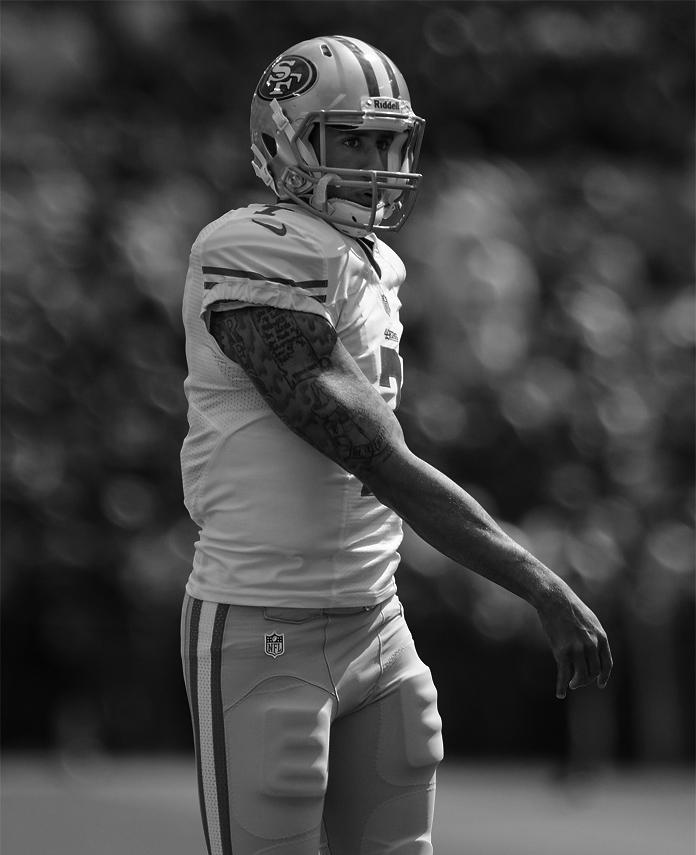
By Zachary Fletcher

“Oh, say can you see, by the dawn’s early light. What so proudly we hailed at the twilight’s last gleaming?” Prior to every football, soccer, baseball and other major sporting event, these words are repeated and emphasized as custom.
Whether live or recorded, the national anthem never fails to get people out of their seats, to put their hands over their hearts, and to sway or sing along to our nation’s main tune.
But recently in the sports world, some athletes have utilized this time for other agendas. Instead of swaying or singing along, some athletes have started kneeling in protest of the anthem.
Colin Kaepernick, former quarterback of the San Francisco 49ers, was the athlete to bring this action to light. He started kneeling back in the beginning of the 2016 season when he still had a contract and somewhere to be each Sunday night.
According to NFL.com, Kaepernick said, “I am not going to stand up to show pride in a flag for a country that oppresses black people and people of color.” He continued, “To me, this is bigger than football and it would be selfish on my part to look the other way. There are bodies in the street and people getting paid leave and getting away with murder.”
Sports has a way of bringing people together. It sparks conversation up at work, brings people together for viewing parties, and requires billion-dollar structures that serve as giant community gatherings for hours at a time.
But Kaepernick’s actions have had the effect of tearing people apart. The strong duality of the issue has created discussion and conflict about the political aspects of free expression. People either support or oppose Kaepernick’s actions and struggle to converse with people who feel oppositely about the issue.
Most politicians in America have a very similar problem with polarization.
Sports and politics aren’t usually associated with one another, but Kaepernick’s actions have caused just that. People have started to wonder about the role of politics in sports and where athletes fit in the debate.
“Their profession does not entail any need to talk politics. They certainly have the right to, and should speak out if they want to,” senior Rob Korbel (Denver, Colorado) said.
“The players have the right to express themselves however they want as long as it doesn’t affect the integrity of the game,” first-year student Nathan Rubinoff (Carmichael, California) said.
“I fully support sports icons like Lebron James, Muhammad Ali, Tommie Smith and John Carlos, and now [Kaepernick] in having the courage to put themselves out on the national stage and use their voice to push for causes they believe in,” first-year student Destin Newfont (Barnardsville, North Carolina) said.
Both Korbel and Newfont show a respect for athletes and their ability to speak out on issues they feel strongly about. But they don’t always agree with how the athlete is speaking out.
“The problem that I had with Kaepernick’s argument is that he didn’t back it up by doing the one thing that can literally give you a political voice,” Newfont said. “He didn’t vote, and by not doing so I think it doesn’t hurt the ‘kneel for the national anthem’ movement but I do think it hurts his personal argument.”
As Newfont asserts, voting is how the citizenship makes change happen in our country. We vote the leaders in that can make the change, and we vote the leaders out who we view as counteractive to making change. Kaepernick’s decision not to vote is a big aspect of the protest situation that goes unnoticed by many.
“In his response he took shots at the people that he needs to work with in order to help the problem, which, in turn, further polarizes the crowd and brings minorities and law enforcement (the two groups Kaepernick alludes to in his response)
further away from joining in a conversation,” Korbel said.
As Korbel said, the political polarization our country is facing does not get better when people continue to pick fights. Discussion is important and Kaepernick’s choice to go on the attack can be seen by some as completely against Kaepernick’s main point.
The shoe deals, commercials and massive sponsorships that involve professional athletes give them a massive stage to act on. People pay attention to them. People care about what they say and some fans may adopt the views of a person based solely on their fame.
Kaepernick has shown that using that stage can be tough. The audience can be rough, the approach taken can be cloudy, and it can ruin a career.
But what does that say about our nation? Are we shutting people down for speaking their minds? Are we making a business decision to not invest in a certain person or product associated with a view?
These questions remain unanswered and will be for a long time. But Kaepernick’s actions have shown just how powerful the force of politics can be in the sporting world.
It will be interesting to watch our country’s steps moving forward on free speech, especially that of athletes.
After all, isn’t this is the land of the free and the home of the brave?
